
Library Security: Better Communication, Safer Facilities—eEditions e-book
The download link for this product can be found on the final confirmation screen after you complete your purchase, and may also be accessed from your Account Profile. For more information about ALA eEditions file types and how to view them on eReaders, desktop computers, and other devices, see this page.
Primary tabs
You don't need to be an ALA Member to purchase from the ALA Store, but you'll be asked to create an online account/profile during checkout to proceed. This Web Account is for both Members and non-Members. Note that your ALA Member discount will be applied at the final step of the checkout process.
If you are Tax-Exempt, please verify that your account is currently set up as exempt before placing your order, as our new fulfillment center will need current documentation. Learn how to verify here.
- Description
- Table of Contents
- About the author
- Reviews
Description
Library work is really all about people. And the inclusive, welcoming nature of the library means that all kinds of people pass through its doors. Not all difficult patrons are dangerous, but some frighten staff and other library users, which can lead to situations that are distracting, troubling, and fraught with liability. For more than a decade, Albrecht, a 15-year police veteran, has presented workshops for libraries on dealing with challenging patrons. His no-nonsense advice will empower library staff in their personal security and give them the tools to confidently communicate with their colleagues, patrons, and members of law enforcement regarding inappropriate behavior. In this book he addresses security issues important to all libraries, including
- Specific guidance for common situations, such as unruly teens, unwanted sexual advances, chronically homeless substance abusers, and more
- The elements of an effective Code of Conduct and how to enforce it
- Tips on how to manage internet usage to minimize potential problems
- How to align with patrons and use language that defuses the conflict
- Forming partnerships with service organizations, homeless shelters, mental health advocacy groups, and other community resources
- How to know when it's time to call the police, plus ideas for increasing law enforcement support
- Ways to make the library more secure through changes to facilities
Through the methods outlined in this book, Albrecht demonstrates that effective communication not only makes library users feel more comfortable but also increases staff morale, ensuring the library is place where everyone feels welcome.
Table of Contents
Preface
Acknowledgments
Chapter 1 The New Library Workplace: Not So Quiet
Chapter 2 Three Keys to a Safer Library: Security-Aware Staff, Creative Customer Service Skills, and Enforced Codes of Conduct
Chapter 3 Challenging Patron Behaviors
Chapter 4 Common Types of Challenging Patrons
Chapter 5 Understanding Threats and Getting Help
Chapter 6 Workplace Violence: Awareness, Prevention, and Response
Chapter 7 Conducting Your Own Site Security Survey
Chapter 8 Community Partnerships: Law Enforcement, Mental Health, and Homeless Services
Chapter 9 Staff Development for a Safer Library: Results, Not Just Rules
Appendix A Library Security Survey Checklist
Appendix B Sample Library Security Suggestions for Site Survey Reports
Appendix C Sample Staff Training Exercises
Appendix D Want Less Stress? Try More BREADS
Appendix E Resources
Index
About the author
Dr. Steve Albrecht
Dr. Steve Albrecht, PHR, CPP, BCC, is board certified in HR, security management, and employee coaching. In 1994, he co-wrote Ticking Bombs, one of the first business books on workplace violence. He holds a doctorate in Business Administration, an M.A. in Security Management, a B.S. in Psychology, and a B.A. in English. He worked for the San Diego Police Department from 1984 to 1999 and is the author of 15 books on business, workplace security, and criminal justice topics, including Library Security: Better Communication, Safer Facilities (ALA Editions, 2015).
Reviews
"The book is comprehensive and practical, with the central focus on providing better customer service in a comfortable, confident, and safe manner. Albrecht does not minimize staff uneasiness in dealing with unruly, threatening, or potentially violent patrons, but he stresses the need for clear, consistent, and publicly posted policies before situations arise … this current title brings together the most up-to-date approaches. Strongly recommended for a broad range of libraries."
— Booklist
"From vandalizing teens to homeless people who spend their days in the library, the gamut of difficult situations is presented with helpful suggestions about maintaining personal safety without alienating people who need assistance … This book will be extremely helpful as librarians in all settings navigate the waters of 21st-century libraries. It is highly recommended for public, school, and academic libraries."
— VOYA
"His expertise in law enforcement and conflict resolution in libraries offers positive leadership responses. This experience combines with his sense of humor to produce a literary contribution that is helpful, unique, and timely. Readers will enthusiastically determine that the pages address essential learning lessons for library administrative personnel and staff. Law enforcement agencies will also gain an awareness of related library security concerns after reading this informative handbook."
— ARBA
"Throughout the book, Albrecht supports his writings with staff development recommendations to ensure that strategies are developed to provide employees with practical tools and procedures to deal with crises, as well as difficult patrons. His writing style is straightforward and he keeps the reader interested throughout the various chapters."
— ASIS Dynamics


